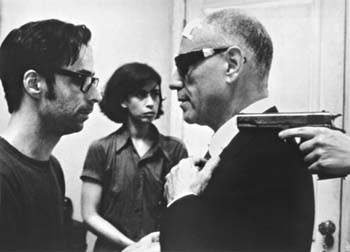Hello, Brazil
Bruno Barreto refuses to take sides in his own political thriller
THE SEPT. 4, 1969, kidnapping of the American ambassador to Brazil is the subject of Bruno (Dona Flor and Her Two Husbands) Barreto's frustrating thriller Four Days in September. Don't expect another Z. Barreto's evenhandedness is absolutely dismaying. Four Days in September resembles those 1950s revisionist movies about the moral problems of German soldiers under the Reich. One of the characters is a naval officer named Henrique. It's his duty to protect Brazil from dissidents--a duty that requires holding their heads under water, stripping them and beating them. We see Henrique in his bed, wracked with nightmares, while his wife digs his guilty trade out of him. The message of the scene is "Even the torturers suffer." One imagines their victims have trouble sleeping too.
The kidnapping is arranged by some Brazilian students who plan to trade Ambassador Charles Elbrick (Alan Arkin) for a jailed comrade. What Barreto shows us, however disapprovingly, is a well-executed political action. The intended results are achieved without bloodshed, even though the students make one stupid mistake along the way. Of the students, Maria (Fernanda Torres), the head of the cell, makes the deepest impression. She has the cute, pinched, yearning look of the Upper East Side radical.
To his credit, Arkin fights off the obvious temptation to make the ambassador a typical Alan Arkin mensch. In fact, he takes the opposite course. His Elbrick is a statue of probity, remote and stiff, and the dispatches he writes in his head to his wife are obviously intended for publication. (I kept wondering, How did one get to be ambassador to Brazil under Richard Nixon? I imagine there was more to the assignment than knowing how to speak a little Portuguese.) Arkin paternalistically admonishes the students, telling them that they and the military junta they oppose are two ends of the horseshoe. The movie itself does a horseshoe-shaped turn: it starts out sympathizing with the students and ends up suggesting that the real tragedy was the discomfiture of our ambassador. What happened to these rebels? They're our point of entry to the story, and they get scattered without even a title card at the end to explain their whereabouts.
Seeing Four Days in September is like reading an objective AP wire story about conditions in, say, Madagascar that leaves you just as ignorant about Madagascar as when you began reading it. As a thriller, Four Days in September has some stimulating moments, but unless I've misread the film grievously, the point is that resistance is futile. In Brazil, there are still powerful defenders of the junta and its crimes, and Barreto seems to be watching his words. Four Days in September is a film that could take as its epigraph the phrase "Some things are better left unsaid."
[ San Jose | Metroactive Central | Archives ]
![]()

Roll Out the Barrel: The American ambassador (played by Alan Arkin) debates the Monroe Doctrine with Pedro Cardoso and Fernanda Torres in 'Four Days in September.'
Four Days in September (R; 125 min.), directed by Bruno Barreto, written by Bruno Gabeira and Leopold Serran, photographed by Félix Monti and starring Alan Arkin and Fernanda Torres.
From the February 5-11, 1998 issue of Metro.
![[Metroactive Movies]](/movies/gifs/movies468.gif)